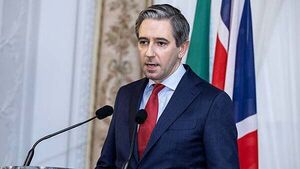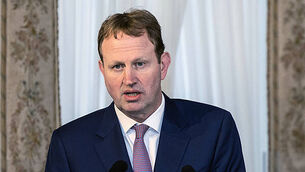Simon Harris responds to warning Ireland is budgeting ‘like there’s no tomorrow’

By Gráinne Ní Aodha and Bairbre Holmes, PA
Tánaiste Simon Harris has said the Irish economy is “in a position of relative strength” after a watchdog said the Government is “budgeting like there’s no tomorrow”.
The Irish Fiscal Advisory Council (Ifac) warned there was a lack of long-term planning and the Government was not saving enough corporation tax windfalls to prepare for future budgetary pressures.
In its latest fiscal assessment report, the Ifac warned once again of an ageing population, the challenge of climate change and of Ireland’s public finances being heavily reliant on corporation tax from a handful of large US multinationals.
It said when “excess” corporation tax was excluded, there is a deficit of almost €14 billion expected next year and that supporting an ageing population and addressing climate change would cost 6 per cent of national income by 2050, worth around €20 billion today.
Ifac said it was now time to prepare for these challenges while the economy was strong.
It said Budget 2026 contained no budgetary forecasts beyond next year, no rule or guide for budgetary policy was set and an updated medium-term fiscal plan had not been submitted to the European Commission, as had been promised.
Asked about the criticisms by Ifac on the way into Cabinet, Mr Harris said he would submit a medium-term economic plan by the end of the year.
He said he also agreed with a multi-annual budgetary plan as suggested by Ifac, calling it a “sensible suggestion”.
He said he had requested a meeting with Ifac last week, after he became finance minister, because he was aware of “the danger of group think” in Ireland previously.
“My number one immediate priority as our country’s new minister for finance is to produce, with government colleagues, a medium-term economic plan to move beyond the temptation for short-termism and to anchor both our spending and taxation plans for the years ahead in this medium-term framework.
“I intend to have that work completed with government colleagues, with the Taoiseach, with Minister (for Public Expenditure Jack) Chambers, by the end of this year.”
He said the Irish economy was “still in a position of relative strength” but that there was “huge” global uncertainty and now was not the time for complacency.
Mr Harris added: “What I want to see as minister is an end to this drift spending, where in year there’s additional spending.
“Not every problem can be monetised, sometimes people just actually have to look at ways of reforming, ways of better delivering services.
“We’re increasing budgets, we’re expanding budgets, but people, agencies, departments, now need to live within those budgets, and we need to get back to that annual cycle of budgeting, grounded and anchored in a new medium-term plan that will be produced by the end of the year.
“I think that is a safe, prudent and sensible measure to take to keep our country and our economy secure in these turbulent times.”





